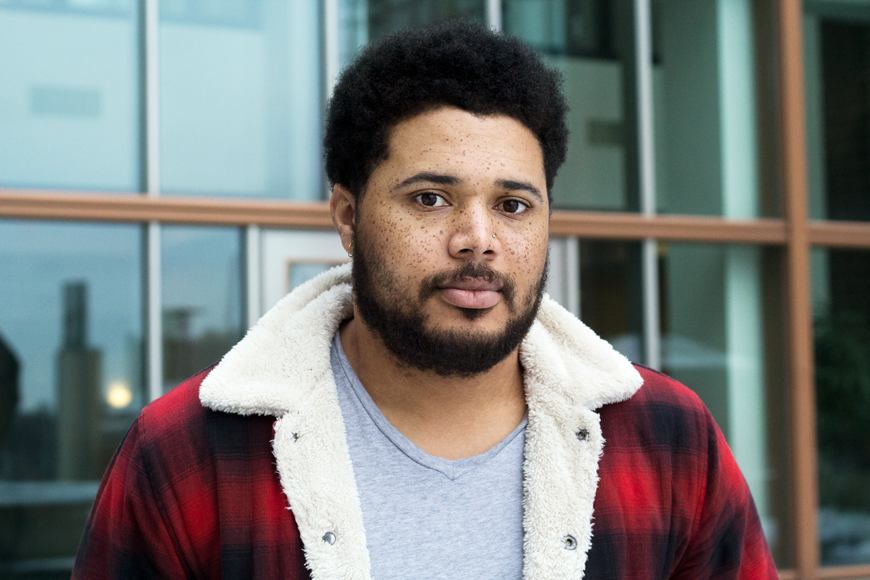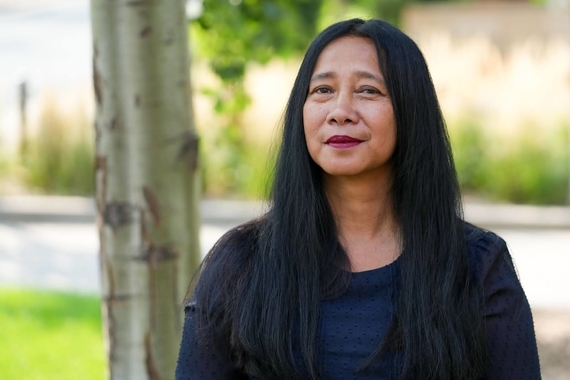A Hard Look at History
Colin Walker Wingate began his time at the University of Minnesota as an English major, and soon added a minor in gender, women, and sexuality studies (GWSS) to “learn how to be a Black feminist in practice.” To Wingate, Black feminism is distinctive from feminism in that it specifically addresses the oppression of Black peoples while creating space for existing beyond that oppression. He considers gender, sexuality, and capitalism in his studies and research as a Black feminist.
He presented two research projects at the National Women’s Studies Association Conference (NWSA) in November 2018. The first project explores slave ships, the sea, and ghosts. His second project looks at way Black women are perceived as rebellious or unruly in a Eurocentric society.
What does literature mean to you and how does it shape your research?
My folks are from the Caribbean—my father is from Trinidad, my mother is from Haiti—so my focus is thinking about the Caribbean and, in this case, Caribbean literature and how that becomes a place to think about questions of gender, sexuality, race, and colonialism.
I am specifically inspired by writers like Dionne Brand and Jamaica Kincaid, who through their literature also talk about what it is to experience life as a Black woman, who was from a previously colonized space, and what happens when you're moved from this particular place into another.
These women didn’t come from places where “womanhood” was seen in the same way as in the United States or even within the dimensions of a white middle-class orientation. So then my research also becomes a question of geography.
Can you tell me about your work on “hauntology”?
My project titled “A Ship to the Door of No Return: ‘Blackened’ Ghost and the Hauntology of the Slave Ship” talks specifically about the hauntology of those who died on slave ships or who were thrown overboard.
The slave ship functions as a space where the categories of life, death, human, and non-human are warped by violence. This violence is the circulation of Black peoples within the geographical spaces known as the Middle Passage and the west.
Hauntology is a tradition of thought, most commonly associated with Jacques Derrida and Avery Gordon, that deals with ghosts and haunting not solely as supernatural, but as part of the discourse of historical traumas that demand we view violence beyond the boundaries of past and present or the living and the dead.
If the ghosts are the remainder of the living who have passed on, what does one call the remainder of those who, in the words of scholar Sharon Patricia Holland, “never achieve, in the eyes of others, the status of the ‘living?’” That is, how do the ghosts of enslaved Black peoples vex the categories of life and death that damned them into nonbeing? Hauntology functions as a methodological tool to think about the living and dying not just of the enslaved, but also all their descendants among the Black diaspora.
And your second project?
“‘Fast and Out of Place’: A Meditation on Unruly Black Being,” focuses on the capacity of Black peoples to disrupt, distort, fracture, and break the coloniality of being through their living.
Black women are perceived as willfully rejecting the normative mode of being that can be described as White, male, heterosexual. Primarily looking to the work of Dionne Brand, Christina Sharpe, Tiffany Lethabo King, and Hortense Spillers, I read “unruliness” as a potential means of critique informed by Blackness’ inability to be contained by an anti-Black world.
Despite the idea that Black existence is constantly mediated, silenced, obscured, restrained, and exterminated by anti-Blackness within the afterlife of slavery, Black lives flourish. Therefore, in order for Black folks to live, they must pit themselves against the very order of the racist life they have been bound to.
What are your hopes for the future and how will this experience help you?
This was the first conference I’ve presented in. So on an individual level, I wondered if I could do it. But this is the type of life I envisioned for myself, and part of it was learning how to jump in and do it. Presenting at NWSA gave me confidence in my abilities and real experience, both of which will help me in my future goals.
After graduating in fall 2019 I plan to further my knowledge of Black studies and GWSS in graduate school. My professors, including Zenzele Isoke, Diyah Larasati, Richa Nagar, and Alexis Gumbs, have inspired me to pursue a doctorate in feminist studies. GWSS graduate students Sayan Bhattacharya, Meño Santillana Blanco, and Naimah Petigny were also vital in my intellectual growth and decision to go to grad school. I hope to become a professor to teach, do research, and affect students’ lives the way my professors have affected mine.
This story was written by an undergraduate student in CLA.



